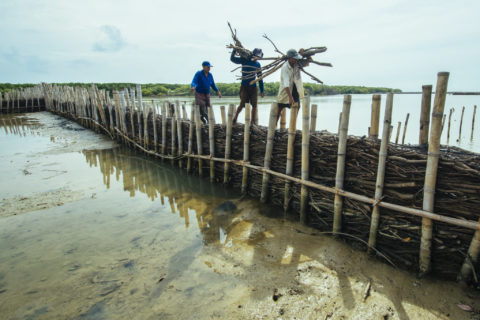
Boskalis and Wetlands International to explore the potential of blue carbon
-
Aquaculture, fisheries and coastal agriculture
-
Climate and disaster risks
-
Climate mitigation and adaptation
-
Coastal resilience
-
Coastal wetland conservation
-
Integrated delta management
Wetlands International and Boskalis, the global dredging and marine contractor, will intensify collaboration to enhance and restore coastal wetland habitat that not only support coastal protection and fisheries but store some of the world’s largest quantities of carbon.
The agreement, signed today, will see the organizations first focus on developing the expertise and knowledge of ‘blue carbon’ ecosystems that can contribute to climate targets, adaptation and biodiversity conservation. ‘Blue carbon’ refers to the carbon stored by the world’s coastal ecosystems, mostly mangroves, salt marshes and seagrasses.
With increasing risks of flooding and erosion, the impacts of climate change on coastal systems and communities are becoming ever more apparent. The dredging sector has a large role to play in safeguarding these areas, providing innovative ways to protect coastlines and introducing adaptive measures.
Jane Madgwick, Chief Executive Officer of Wetlands International said: “As natural coastal protection, carbon and water stores, wetlands are vital in helping communities and nature deal with the effects of climate change. Together with Boskalis, we aim to further develop our blue carbon knowledge and expertise to help nature-based approaches become best practice across the maritime and dredging sector.”
Theo Baartmans, Board Member and Chief Operating Officer, Boskalis: “As a leader in the industry, Boskalis is keen to further develop nature-based solutions to protect and enrich coastal ecosystems from the consequences of climate change. By collaborating with Wetlands International we can combine our respective expertise to protect and further enhance coastal wetland habitats in terms of biodiversity whilst simultaneously utilizing their potential to store carbon.”

Boskalis and Wetlands International have worked together for several years as active members of Ecoshape, a pioneering consortium developing ‘building with nature’ principles to support nature-based flood defense, coastal restoration, resilient deltas and sustainable ports. Such principles prioritize the use of natural processes and materials such as sediment flow and mangrove restoration to meet society’s need for infrastructure.
Noteworthy projects undertaken together include the ‘Building with Nature Indonesia’ program, where mangrove rehabilitation and nature-based coastal protection provide a foundation for local economy and community development.
Boskalis and Wetlands International are committed to strengthening the knowledge base and sharing the learnings from the collaboration with the sector as a whole.
Coastal ecosystems such as mangrove forests, seagrass meadows, and tidal salt marshes are important habitat for all kinds of species. These ecosystems contribute a major part of people’s livelihoods and maintain water quality. Their conservation and restoration are gaining interest, not only in terms of biodiversity value, but as climate buffers, providing a cost-effective way to both take carbon out of the atmosphere while ensuring communities and nature can adapt to the impacts of climate change.
Building with Nature Indonesia is a programme led by Wetlands International in close collaboration with Ecoshape, the Indonesian Ministry of Marine Affairs and Fisheries (MMAF), and the Indonesian Ministry of Public Works and Housing (PU). The programme is supported by the Dutch Sustainable Water Fund and The Federal Ministry for the Environment, Nature Conservation, and Nuclear Safety (BMU) as part of the International Climate Initiative (IKI).
